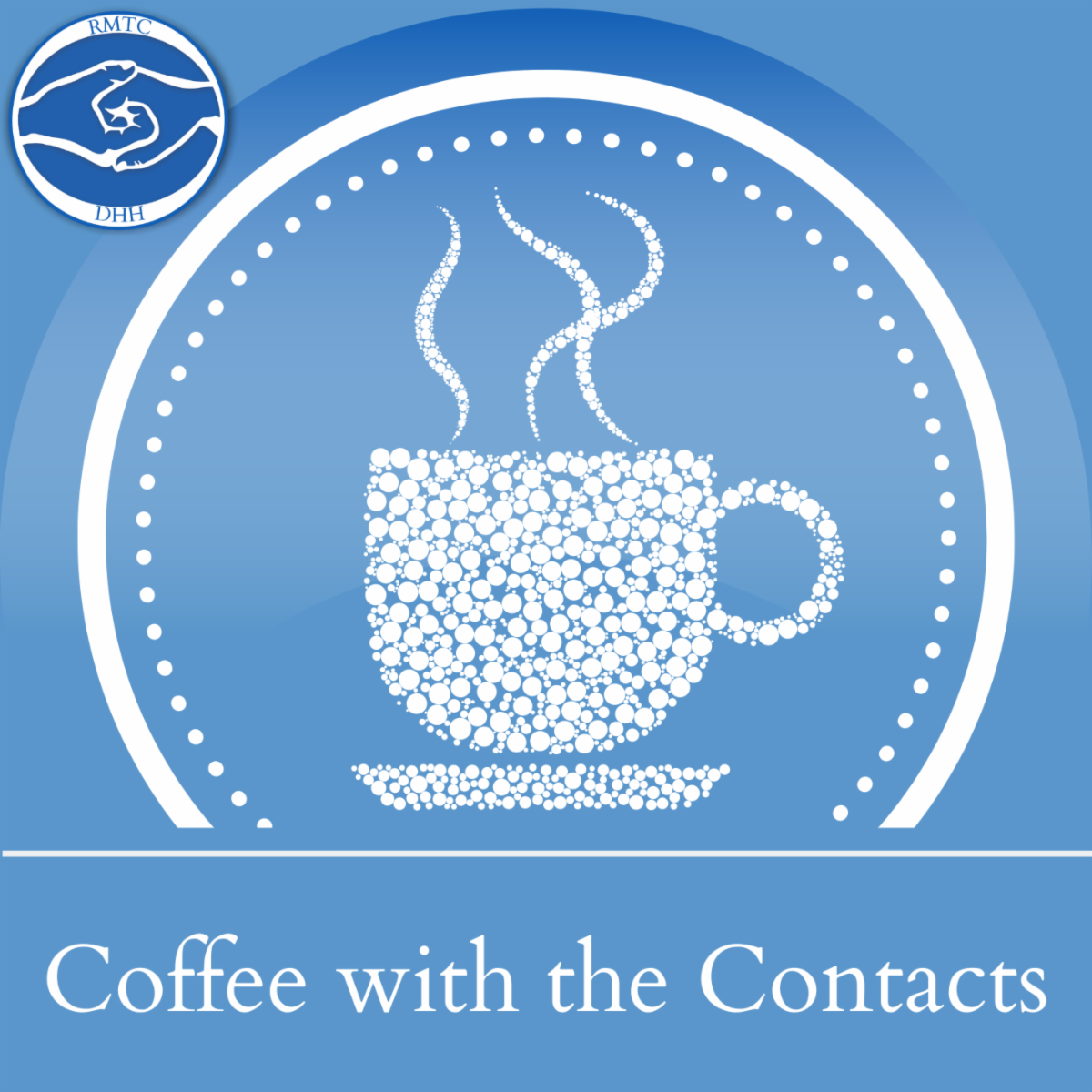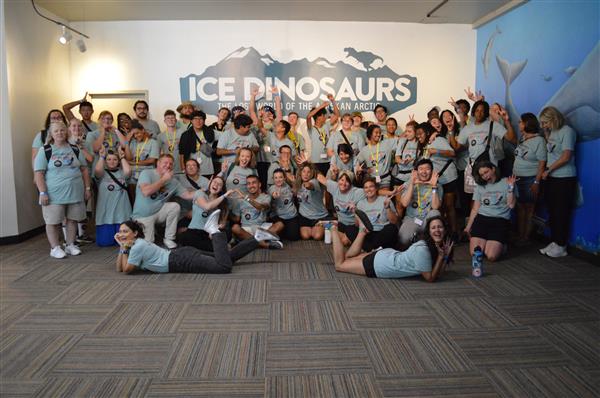|
Theme:
- High-Leverage Practices (HLPs) 19: Use Assistive and Instructional Technology
Articles:
- AT and IT for Students who are DHH
- Technology and Learning Connections
- Audiology Awareness Month
News from RMTC-DHH:
- TA-Live! High-Leverage Practices: HLP #19
- Working With the Experts - Deaf/Hard of Hearing (WWE-DHH): See the Sound Visual Phonics and Teach Your Child to Read in 100 Easy Lessons paired with Visual Phonics
- Tea with the Teachers
- Coffee with the Contacts
- New RMTC-DHH Team Member
Teacher Spotlight
- Ashley Starr and Sean Wagstaffe
- Palm Beach County
Expanded Skills Spotlight
- Troubleshoot Hearing Assistive Technology (HAT)
- Standard: SP.PK12.DH.3.4
Teacher Toolkit:
- LiveBinder of Tools for HLPs
- Loan Library Resources
Did You Know?
- 2024 FEDHH Conference
- 2025 STEM Academy
- Texas Computer Education Association
- RIT/NTID Middle School Math Competition for Students who are DHH
- FREE ATIA Online Courses
Upcoming Events
| |
HLP 19: Use Assistive and Instructional Technologies | |
The theme for this month is based on the nineteenth practice from the Collaboration for Effective Educator Development, Accountability, and Reform (CEEDAR) Center and Council for Exceptional Children (CEC)’s High-Leverage Practices in Special Education: Use Assistive and Instructional Technologies. Keep reading for resources and more! | | | |
AT and IT for Students who are DHH | |
|
High-Leverage Practice (HLP) 19 emphasizes the critical role of assistive and instructional technology (AT and IT) in supporting school-aged students with disabilities. This practice highlights the necessity of aligning technology with the unique and highly-specialized needs of each student. For students who are deaf and hard of hearing (DHH), assistive technology is particularly essential, enhancing communication, learning, and social interaction. Thoughtfully selected technologies can reduce barriers to learning and promote greater independence, fostering a more accessible educational environment.
Instructional technology, as defined by HLPs, includes various products and approaches that support learning and engagement, such as educational games and instructional videos. For students who are DHH, this may encompass applications like ASL dictionaries or websites such as the Described and Captioned Media Program (DCMP). Instructional technology tools can also be instrumental in implementing Universal Design for Learning (UDL). UDL emphasizes providing multiple means of representation, engagement, and action/expression to ensure that every student has access to quality learning experiences. Technologies such as captions and visual alert systems benefit all students, creating an atmosphere of belonging where everyone can thrive.
The integration of AT within the UDL framework allows educators to cater to diverse learning needs effectively. When UDL principles and assistive technologies are effectively implemented, the benefits for all students, including those who are DHH, are significant and may include the following: enhanced learning through diverse materials, improved communication among peers and teachers, greater independence in their learning journey, and increased participation that fosters a sense of community in the classroom.
Deaf education professionals can reach out to their local assistive technology specialists (LATS) or regional LATS (R-LATS) for support in the assessment, selection, and implementation of assistive technologies. To find your district AT contact, visit TLC’s AT District Contacts web page.
Want more? For more information on assistive technology for students who are DHH, check out the RMTC-DHH Assistive Technology web page or visit the Problem-Solving/Response to Intervention Technology and Learning Connections (TLC) website to learn more about AT and IT.
| |
Technology and Learning Connections | The Technology & Learning Connections (TLC) project is a part of Florida’s Multi-Tiered System of Supports (MTSS) through the Problem Solving/Response to Intervention (PS-RtI) Project at the University of South Florida. Their services support the local development of highly effective classrooms for all students based on the Florida Standards through a multi-tiered system of supports in a universal education system. TLC also manages the AT & UDL Loan Library. Available to district/school staff approved by ESE directors, including local assistive technology specialists (LATS), the loan library supports assistive technology assessments/evaluations, professional development in the use of assistive technology (AT) in the classroom, and the use of universal design for learning (UDL) strategies to support all students. | |
|
The AT & UDL Loan Library has some hearing assistive technology devices (e.g., REDCAT Classroom Audio System, personal FM systems) that districts can check out in order to conduct trials before purchasing. Borrowing this type of equipment allows teams to implement and collect data on assistive technology use, a critical component to determining educational benefit and need before investing in the equipment.
If you are interested in borrowing from the AT-UDL loan library, please reach out to your district’s LATS or to RMTC-DHH.
| |
Audiology Awareness Month | |
Working With the Experts - Deaf/Hard of Hearing (WWE-DHH): See the Sound - Visual Phonics and Teach Your Child to Read in 100 Easy Lessons Paired with Visual Phonics |  | |
There are still some spots left! Please join the Resource Materials and Technology Center (RMTC-DHH) for WWE-DHH: See the Sound - Visual Phonics and Teach Your Child to Read in 100 Easy Lessons Paired with Visual Phonics, a two-day face-to-face event. See the Sound - Visual Phonics is a multisensory evidence-based intervention approach to phonics instruction rooted in the science of reading. Teach Your Child to Read in 100 Easy Lessons is an evidence-based direct instruction program. When paired with See the Sound - Visual Phonics, evidence supports improved reading for students who are DHH. The event will take place in Brandon, Florida, on November 21 and 22, 2024.
*Please note this event is intended for Florida staff who have not been previously trained in See the Sound - Visual Phonics. We anticipate offering a refresher of See the Sound - Visual Phonics. If you are looking for a refresher, please fill out this form.
| | |
TA-Live! HLP 19: Assistive and Instructional Technologies | |
In the TA-Live! series, RMTC-DHH is diving deep into the Collaboration for Effective Educator Development, Accountability and Reform (CEEDAR) Center and the Council for Exceptional Children (CEC)’s High-Leverage Practices in Special Education and how teachers of the DHH can utilize these practices through the lens of their specialized knowledge of students who are DHH.
Before the next scheduled discussion, participants will be encouraged to*:
*Unable to complete the homework? Please feel free to join RMTC-DHH staff for a discussion on resources and tools Florida educators utilize related to the HLP discussed.
When?
The next TA-Live! session will be October 30th, from 2:00 p.m. to 3:00 p.m. ET (1:00 p.m. to 2:00 p.m. CT). With a watch party of the homework starting at 1:45 p.m. ET (12:45 p.m. CT).
|  | For this month’s TA-Live! discussion session, RMTC-DHH will be joined by the Florida PS/RtI Technology and Learning Connections (TLC) project. Come ready with questions about AT and students who are DHH or who are deaf with additional disabilities. Have questions for TLC you would like to submit before the discussion session? Please fill out this form. | | |
|
Please join RMTC-DHH for Tea with the Teachers, a professional learning community (PLC). In this facilitated PLC, teachers of the deaf/hard of hearing (TODHHs) and their colleagues will have the opportunity to propose and discuss topics related to the education of students who are DHH. Participants are encouraged to pose questions throughout the year on the Tea with the Teachers Topic Submission Form. Collected inquiries will be sorted into categories to be presented to those in attendance for discussion among peers during the event.
When?
Date(s): 11/6/2024; 2/26/2025; 4/2/2025
Time(s): 9:00 a.m. - 10:00 a.m. EST (8:00 a.m. - 9:00 a.m. CST)
| | |
 | |
RESCHEDULED BONUS Coffee with the Contacts - Due to Hurricane Milton, the Coffee with the Contacts event scheduled for October 11 has been postponed to November 1. Florida contacts for DHH programs and their designees are invited to join RMTC-DHH for a bonus session of Coffee with the Contacts - DHH Rule Edition. In this facilitated conversation participants will have the opportunity to pose questions and discuss topics related to the updating of Rule 6A-6.03013, Florida Administrative Code (F.A.C.). Participants are encouraged to submit their questions for this special event in the registration found on the Contacts web page. Collected inquiries will be sorted into categories to be presented to those in attendance for discussion among peers during the event.
Date: November 1, 2024
Time: 9:00 a.m. - 12:00 p.m. (ET)
Note: If you registered for the October 11 event, your registration has already been collected and you DO NOT need to register again. If you have additional questions to add to your registration, you can email them to fldhhcontacts@rmtcdhh.org
| | |
Meet Sara Tinti, our newest team member at RMTC-DHH! With a degree in Deaf Education from the University of North Florida (UNF) (SWOOP!), Sara has spent the last five years as an itinerant teacher in Duval County, where she rose to become the lead itinerant teacher. She is currently serving her second term as the Webmaster on the Florida Educators for Students who are Deaf and Hard of Hearing (FEDHH) board. Sara has presented at conferences at both the state and international levels. Additionally, she is the co-chair for the steering committee for the Deaf Education program at UNF and was previously a parent advisor for the Florida School for the Deaf and Blind. Sara brings a wealth of technology expertise and a deep passion for supporting her peers. She is excited to extend the support she provided to her Duval team on a larger scale with RMTC-DHH. Welcome, Sara! | | |
|
Interested in the assistive technology highlighted in the teacher spotlight? There are several text-to-speech video avatar options with a myriad of features. The following are some examples. As with any software or media, make sure to preview the tool and get appropriate permissions before using with students.
Mango Animate: Mango Animate is a free video generator to create talking avatar videos from text. Its library of voice choices and face swap options make it a good fit for educational purposes
Neiro: Neiro is a customizable video avatar creator with over 140 languages. Users can choose from 100+ customizable avatars or upload their own for a personal touch. It will even translate the video script into other languages.
Synthesia: This platform allows users to create videos by typing in text. It offers studio-quality, lifelike videos with avatars and voiceovers in multiple languages
Synthesys: Transform text into realistic avatars in five clicks. Synthesys offers unlimited free trials and provides over 300 voices and 140 spoken languages to customize the video production.
Veed: Veed’s character animator combines tools to provide personalized video avatars with hyper-realistic voices. It supports various voice profiles, languages, and accents
Vidnoz: Vidnoz is an efficient and free text-to-speech video avatar generator. The website has over 1,200 avatars and voices, and more than 2,00 templates from which to choose. Users can also upload pictures to use in videos where the software makes approximations to mouth movements of spoken language.
| |
Expanded Skills Spotlight | |
Troubleshooting Hearing Assistive Technology | |
|
|
Resources:
In order to keep all the resources in one place, RMTC-DHH has created a LiveBinder that is categorized by the twenty-two “High-Leverage Practices for Students with Disabilities” from the CEEDAR Center and the Council for Exceptional Children (CEC). To see the resources available by each category, check out the High-Leverage Practices in Special Education LiveBinder!
| | | |
Resources from the RMTC-DHH Media and Materials Loan Library:
The below resources from the Media and Materials Loan Library*.
| *Florida stakeholders may borrow materials from RMTC-DHH's Media and Materials Loan Library, for FREE. Each material comes with a return label, making even the shipping at no charge to the borrower. | |
Resources Related to HLP 19: Assistive and Instructional Technology
- Achieving Effective Hearing Aid Use in Early Childhood (Catalog Number: 1878)
- Advocacy in Action - A Self-Advocacy Curriculum to Students who are D/HH (Catalog Number: 1938)
- Building Skills for Independence in the Mainstream (Catalog Number: 1940)
- C.O.A.C.H. - Self Advocacy & Transition Skills for Secondary Students who are Deaf or Hard of Hearing (Catalog Number: 1939)
- Assistive Technology in Special Education- Resources for Education, Intervention, and Rehabilitation (Catalog Number: 1877)
| | | |
The 2024 Florida Educators of the Deaf and Hard of Hearing (FEDHH) conference is now open for registration. The conference will be held November 8th-9th, 2024 at the Hilton University of Florida Conference Center Gainesville, located at 1714 SW 34th St, Gainesville, FL 32607. | |
 | |
NTID Regional STEM Center (NRSC) STEM Academy: Prepare for college with an immersive experience designed specifically for students who are deaf and hard of hearing, entering grades 10-12 in fall 2025 or graduating in spring 2025. This is an overnight experience for students from Alabama, Arkansas, Florida, Georgia, Kentucky, Louisiana, Mississippi, North Carolina, Oklahoma, South Carolina, Tennessee, and Texas.
Decatur, AL June 8-28, 2025 or
Jacksonville, FL July 9-29, 2025
Registration opens October 15!
Want to learn more before you apply? Register for a virtual Question & Answer Session on one of the following dates:
Thursday, November 14, 2024
11:30 AM CT / 12:30 PM ET (Spanish Interpretation)
3:00 PM CT / 4:00 PM ET
6:30 PM CT / 7:30 PM ET
Join to ask any questions you may have about STEM Academy 2025 and get all the information you need before applying!
STEM Academy Flyer - English
STEM Academy Flyer - Spanish
For questions, contact Cara Wilmot, wilmot.cara@aidb.org.
aidb.org/StemAcademy
| |
Texas Computer Education Association (TCEA)
| |
RIT/NTID Middle School Math Competition for Students who are DHH
| |
|
Middle School Math Competition 2025
Southeast Region | January 24-26, 2025
Texas School for the Deaf | Austin, TX
The Rochester Institute of Technology and the National Technical Institute for the Deaf (RIT/NTID) is looking for dedicated teachers of the deaf in Florida to coach teams of middle school students who are Deaf and Hard of Hearing (15 years or younger) for the Southeast Region Middle School Math Competition.
This event offers a valuable opportunity for students to showcase their mathematical abilities and compete on a regional stage. To participate, each team must have a coach from their school. The top four teams from the Southeast Region will advance to the National Math Competition at RIT/NTID on April 4-6, 2025, with an all-expenses-paid trip.
Important Information:
Registration Deadline: November 15, 2024
Competition Dates: January 24-26, 2025
Encourage your students to get involved and consider coaching a team to represent Florida in this exciting competition.
Register now: rit.edu/ntid/mathcompetition
| |
|
ATIA and the PS/RtI – Technology & Learning Connections, Florida’s MTSS Project are pleased to announce the partnership to provide complimentary unlimited access of all ATIA online courses to the participants supported by the PS/RtI – MTSS project.
With the partnership, participants receive complimentary UNLIMITED access to ATIA online courses.
These online education programs include live and recorded online courses by national experts on a variety of topics across the spectrum of the assistive technology industry sectors. Online courses are 60 and 90 minutes in length. Complimentary CEUs are available for completion of these programs.
| |
RMTC-DHH provides Tech Notes as a free resource to teachers, professionals, and families around the state in order to pass along potentially useful information and expand the knowledge and opportunities available to educators and families of children who are deaf/hard of hearing. This email was funded by the Florida Department of Education Bureau of Exceptional Education and Student Services through federal assistance under the Individuals with Disabilities Education Act (IDEA), Part B funds. The information included does not reflect any specific endorsement by any parties involved. | | | | |